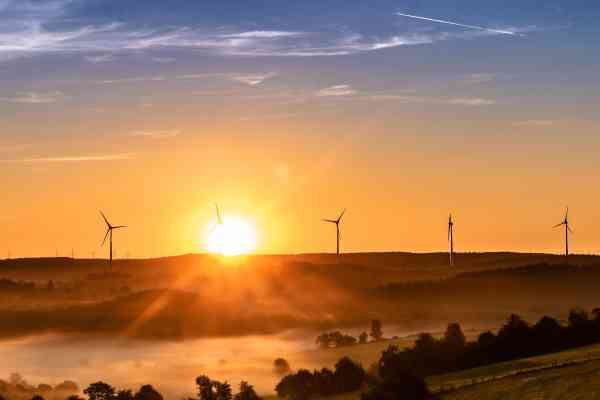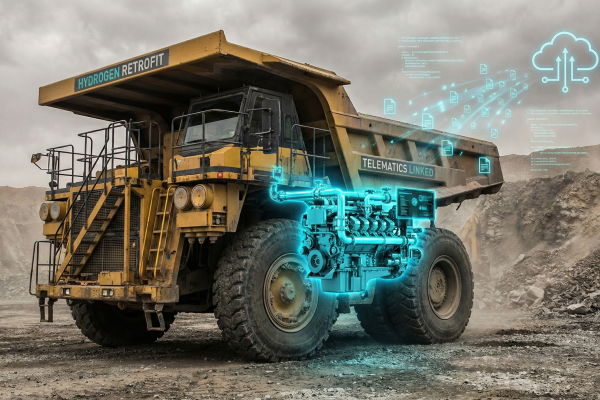October 27th, 2022 | 12:13 CEST
Volkswagen, dynaCERT, Linde - Energy transition outside Europe?
Hydrogen is an essential part of the energy transition. In order to produce it, fossil fuels are still needed, and these are anything but affordable in Europe at the moment. So it is no wonder that Linde plc is looking to delist from the DAX in order to expand its business more lucratively. The listing on the NYSE remains in place. Volkswagen is also feeling the barriers in its home country of Germany, especially for its in-house battery production location. But numerous patents in hydrogen solutions indicate the direction in which the Group will move. dynaCERT has long since arrived there with its hybrid model for diesel trucks. The patented HydraGEN™ technology reduces carbon and increases fuel efficiency. We look at why it is smart to focus on values outside Europe.
time to read: 6 minutes
|
Author:
Juliane Zielonka
ISIN:
VOLKSWAGEN AG VZO O.N. | DE0007664039 , DYNACERT INC. | CA26780A1084 , LINDE PLC EO 0_001 | IE00BZ12WP82
Table of contents:

"[...] Why should a modular electrolyzer cost more than a motorcycle? [...]" Sebastian-Justus Schmidt, CEO and Founder, Enapter AG
Author
Juliane Zielonka
Born in Bielefeld, she studied German, English and psychology. The emergence of the Internet in the early '90s led her from university to training in graphic design and marketing communications. After years of agency work in corporate branding, she switched to publishing and learned her editorial craft at Hubert Burda Media.
Tag cloud
Shares cloud
dynaCERT - On track for success with hydrogen hybrid solution
The rising cost of diesel and gasoline is increasing the pressure on industry to find alternative forms of propulsion that are more cost-effective in the long run and produce less CO2. Emission-free cars are already commonplace on our roads. But the logistics industry, in particular, can benefit from the switch to zero-emission fuels. After all, countless trucks drive on highways every day to transport their goods from point A to point B.
Hydrogen vehicles generate their own electricity, which they feed into the engine. The hydrogen gas is stored in thick-walled, safety-sealed tanks behind the cab before being fed into the fuel cell. Inside the cell, electrons separate from the hydrogen atoms through an electrochemical reaction. The movement of these electrons generates electricity.
dynaCERT Inc. is a Canadian technology company that provides carbon emission reduction solutions for trucks and vans. That makes the Company a component in the conglomerate of the growing global hydrogen economy. Their patented HydraGEN™ technology generates hydrogen and oxygen using an electrolysis system. The gases are added to the air intake to improve combustion. It has been shown to reduce carbon emissions and improve fuel efficiency.
While Europe seems to be left behind by energy prices, Canada is upgrading accordingly. The Canadian Commercial Vehicle Fleet (CUF) Council has just developed a standard that will be useful to the North American logistics industry and the environment. In addition, the CUF has also lobbied the Canadian government for funding and its participation in the development of environmentally friendly hybrid trucks. This week, a who's who of Canadian fleet decision-makers committed to safety and reliability will meet with utility manufacturers in North America at the trade show of the same name. Fleet representatives and suppliers share ideas and best practices and discuss common challenges to find solutions that benefit the safety of Canadian utility workers.
dynaCERT's pilot program, in cooperation with Alectra Utilities Corporation, has proven that its in-house technology successfully contributes to CO2 reduction. In 2021, Alectra conducted a six-month pilot program with HydraGEN in 13 vehicles. Significant savings of over 8,000kg of carbon dioxide equivalent (CO2) were recorded; each vehicle consumed an average of 230l less diesel. HydraGEN technology is used in a wide range of applications, from trucks to refrigeration units, power generators, ships, construction equipment and rail vehicles. dynaCERT's invention holds great potential to be used successfully in the near future. Networking with industry partners at the trade fair in Canada is another step towards an emission-free future.
Volkswagen - Bureaucracy puts the brakes on technological change
The Volkswagen Group is also focusing on hydrogen as an energy source. Hydrogen-based fuel cell technology has been published in more than 30,000 patent families over the past 20 years. It is, therefore, a sector that has attracted the attention of the Wolfsburg-based company. The patent families are divided into fuel cell technologies, cell materials and components, control systems, fuel cell systems, and hydrogen storage.
Volkswagen has filed a patent for a special fuel cell with kraftwerk TUBES GmbH. BusinessInsider reports that Volkswagen is keeping its path forward open and pursuing hydrogen technology despite conflicting statements. It comes down to a mix of the internal combustion engine with proportionate hydrogen. Just as dynaCERT has already developed.
Volkswagen, however, is being thwarted by the state's own bureaucracy. In the spring of 2020, VW submitted the first building application for its new factory to the Braunschweig Trade Supervisory Office. In July, the documents were complete enough for the office to lay them out and ask other authorities, such as the city of Salzgitter, for comments. At the beginning of July, VW celebrated the symbolic laying of the foundation stone for VW's first battery cell factory in Salzgitter with German Chancellor Olaf Scholz.
Since October 4, Volkswagen has been allowed to start certain construction work at the VW plant in Salzgitter on its own responsibility. But the approval authority has suspended the deadline for issuing the final construction permit. The provisional deadline was seven months, but further documents must be submitted or amended before a final decision can be made. The final approval is not yet foreseeable. VW says battery cells should be ready in three years, by 2025.
Linde Plc - Traditional company seeks to delist from Dax
Linde is a leading global industrial gases and engineering company. The Group produces and distributes atmospheric and process gases such as nitrogen, hydrogen and helium. In 2018, the Company entered into a merger with US rival Praxair. Since then, Linde has been listed on two stock exchanges, the NYSE and Frankfurt, Germany. The merger moved the Company's headquarters to Dublin, Ireland, and its operating business to the UK.
Now, the management board has approved a proposal that includes a shareholder vote on an intra-group restructuring.
This restructuring would result in the delisting of Linde plc shares from the Frankfurt Stock Exchange. If implemented, a new holding company will be established through an Irish Scheme of Arrangement and a related domestic Irish merger. Shareholders will receive one share in the new holding company for each Linde plc share held. This is expected to trade under the existing stock exchange symbol (NYSE: LIN; FWB: LIN) and bear the name Linde.
Sanjiv Lamba, CEO of Linde plc, says: "We are very proud of our rich history and strong presence around the world, including the German tradition." The fine words hint at a healthy shrinking of the group. After all, sanctions against Vladimir Putin's government have caused Linde to lose multibillion-dollar, lucrative, major contracts for gas liquefaction and processing plants. As a result, the US-German group is now planning job cuts in its plant engineering division. With a market capitalization of almost EUR 145 billion, the departure would not necessarily make Germany look better in light of the energy crisis.
"The dual listing structure has served us well from the beginning, but it has limited the valuation of our shares with European restrictions and added complexity," CEO Lamba continues. If approved by shareholders, delisting from the DAX will occur in March 2023.
Linde is moving into hydrogen production as part of the global shift to cleaner fuels. The production of gases consumes a lot of energy. Linde compensates for this by using renewable energies. Through its customers, which include hydrocarbon companies, the Company remains exposed to the energy transition. From this point of view, a withdrawal from Europe and an increase in international site activities is quite understandable, also because of the EU regulations that will no longer apply.
Things are getting tight for Europe as an industrial location. With the planned delisting of Linde plc, the DAX, of all places, is losing a heavyweight in gas production. The EU regulations seem too tight for the group, so a strengthening of international business seems to be the consequence. This is also evident at dynaCERT, which is meeting other industry representatives this week to strengthen cooperations for its business expansion. Hydrogen is an essential building block of the energy transition. The Volkswagen Group, for example, has registered numerous patents in this area. However, German bureaucracy is causing unnecessary delays in the construction of its own battery plant in Salzgitter, of all places.
Conflict of interest
Pursuant to §85 of the German Securities Trading Act (WpHG), we point out that Apaton Finance GmbH as well as partners, authors or employees of Apaton Finance GmbH (hereinafter referred to as "Relevant Persons") may hold shares or other financial instruments of the aforementioned companies in the future or may bet on rising or falling prices and thus a conflict of interest may arise in the future. The Relevant Persons reserve the right to buy or sell shares or other financial instruments of the Company at any time (hereinafter each a "Transaction"). Transactions may, under certain circumstances, influence the respective price of the shares or other financial instruments of the Company.
In addition, Apaton Finance GmbH is active in the context of the preparation and publication of the reporting in paid contractual relationships.
For this reason, there is a concrete conflict of interest.
The above information on existing conflicts of interest applies to all types and forms of publication used by Apaton Finance GmbH for publications on companies.
Risk notice
Apaton Finance GmbH offers editors, agencies and companies the opportunity to publish commentaries, interviews, summaries, news and the like on news.financial. These contents are exclusively for the information of the readers and do not represent any call to action or recommendations, neither explicitly nor implicitly they are to be understood as an assurance of possible price developments. The contents do not replace individual expert investment advice and do not constitute an offer to sell the discussed share(s) or other financial instruments, nor an invitation to buy or sell such.
The content is expressly not a financial analysis, but a journalistic or advertising text. Readers or users who make investment decisions or carry out transactions on the basis of the information provided here do so entirely at their own risk. No contractual relationship is established between Apaton Finance GmbH and its readers or the users of its offers, as our information only refers to the company and not to the investment decision of the reader or user.
The acquisition of financial instruments involves high risks, which can lead to the total loss of the invested capital. The information published by Apaton Finance GmbH and its authors is based on careful research. Nevertheless, no liability is assumed for financial losses or a content-related guarantee for the topicality, correctness, appropriateness and completeness of the content provided here. Please also note our Terms of use.




